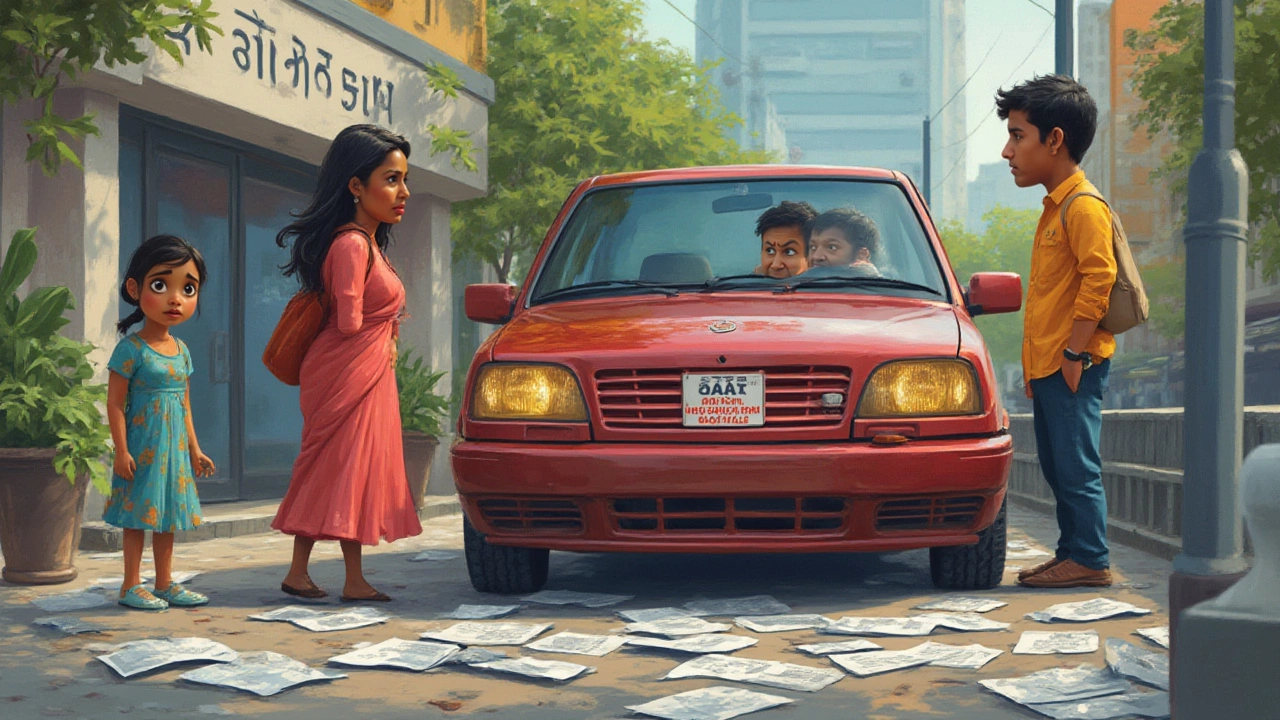Virginia Personal Property Tax Consequences: What If You Don’t Pay?

Jul, 17 2025
Picture this: you’re opening your mail, bills stacked up, and there it is—the Virginia personal property tax bill. It’s not just another piece of paperwork you can toss aside. Lots of Virginians make the mistake of not paying their personal property taxes on time, or skipping them entirely—maybe you’re between paychecks, or maybe you just forgot. But ignoring that bill doesn’t make it disappear. Instead, it’s like poking a bear; the consequences build fast and can attack your wallet, your ability to drive, and even your future plans.
Personal Property Taxes in Virginia: Not Just Cars
When most folks hear "personal property tax" in Virginia, they think about their car or truck. That’s definitely a big piece of it, and according to the Virginia Department of Taxation’s 2024 report, cars, motorcycles, and RVs made up almost 88% of all personal property valuation in the state last year. But that’s not the whole story. This tax can also cover things like trailers, boats, campers, and even business equipment if you own a company. Your local government—city or county—sets the rate and collects the money.
What’s wild is how different the bills can be depending on where you live. In Fairfax County, for example, the car tax rate in 2024 was $4.13 per $100 of assessed value, but some rural counties have rates below $2.00. And every year, the value of your property is reassessed, so the bill can go up or down depending on market trends and depreciation. Newer, more expensive vehicles obviously mean heftier taxes. The due dates also vary by county, so what’s late in Richmond might still be on time in Loudoun.
There aren’t many exemptions. Sure, some vehicles used primarily for farming, government-owned property, and disabled veterans’ vehicles can qualify for full or partial relief. Virginia’s Personal Property Tax Relief Act (PPTRA) gives most car owners a percentage break on personal-use vehicles under $20,000—usually around 27% nowadays—but you’ll still end up owing a hefty chunk in most cases. The tax is not just an inconvenience. For counties and cities, it’s a key revenue stream that keeps schools, fire services, and infrastructure running. That means they take collecting it very seriously.
The Unpaid Bill: Late Fees, Interest, and Collection Action
So, what if you shove that property tax bill in a drawer and forget it? Your local Treasurer’s office starts by adding a late fee—usually 10% of the unpaid tax right off the bat, according to the Code of Virginia § 58.1-3916. Doesn’t sound like much? On a $500 bill, that’s $50 immediately tacked on. Most counties then pile on interest, charged monthly until you pay off everything you owe. As of 2025, the annual interest rate is 10%, calculated monthly (so 0.83% each month).
Here’s a typical scenario. You owe $500 in June and skip payment. By July, you owe an extra $50 (late fee), plus about $4 in interest for the month. If you still haven’t paid three months later, you’re nearly $65 deeper in the hole—and that’s before the county gets tired of waiting.
If you’re thinking they’ll just write it off, think again. Virginia localities routinely send multiple notices, but if accounts stay unpaid, they turn up the heat. Some counties use third-party collection agencies, which can mean more fees and persistent phone calls. Others post "delinquent lists" on government websites—sometimes naming names, which is a rough way to land on Google.
Here’s a quick breakdown of common penalties and fees based on data from several major Virginia counties:
| Jurisdiction | Late Fee | Interest Rate (Annual) | Collection Agency Fee |
|---|---|---|---|
| Fairfax County | 10% | 10% | 17–20% of balance |
| Richmond City | 10% | 10% | 15% |
| Loudoun County | 10% | 10% | Up to 20% |
So the longer you let it slide, the bigger the pile of penalties, and the more costly it gets to catch up. And all those extra fees? None of them go toward knocking down your actual tax bill—they’re just money down the drain.

How Unpaid Taxes Affect Your Vehicle, Credit, and Life
Virginia doesn’t let unpaid taxes slide. If your taxes go unpaid too long, the county won’t just ding your wallet—they’ll hit your ability to drive. Under state law, local Treasurers can block you from renewing your Virginia vehicle registration if personal property tax is unresolved (see DMV stops, Code of Virginia § 46.2-705). That means the next time you try to get new tags for your car, you get a big red X—no update until you pay every dime plus fees. Driving with expired tags in Virginia can get you pulled over and fined, and if your insurance company finds out your registration isn’t current, good luck with claims.
This "DMV stop" system is automated and relentless. According to state DMV records, more than 615,000 stops were placed on vehicles in 2024 alone for unpaid local taxes or parking tickets. If you’re using your vehicle for work, or you need it to get your kids to school, that’s not just a hassle — it’s a real disruption to your daily life.
What about your credit? Many counties and cities turn over long-unpaid accounts to collections, and some file a "lien" against your state tax returns. A collection action or public lien can show up on your credit report and drag down your credit score for years. That’s a nasty surprise next time you’re applying for a car loan, a home, or even a job where they check your credit history.
But it doesn’t stop at paperwork. Virginia localities have serious leverage—they can garnish your wages, seize your bank account, or place a "distress warrant" to repossess the personal property (your vehicle, your trailer, or even business tools) if your bill stays unpaid for too long. It rarely comes to that, but the law allows it, and they’ve done it before when ignored for months or years.
If you move to a different city or county, it won’t erase the debt, either. Virginia local governments share tax and collections data statewide and with the DMV. That’s why vehicles can’t just be "registered somewhere else" until the account is fixed. If you sell a car and the taxes aren’t paid up, you can get caught in red tape when transferring or unregistering the vehicle.
In 2024, news outlets covered several cases where people tried to trade in or sell cars at dealerships, only to find unaddressed personal property tax stops making the whole thing impossible. Unpaid taxes don’t just affect you—they make hassle for everyone in the chain.
Real-Life Tips: How to Avoid Trouble With Virginia Personal Property Tax
The best way to handle Virginia’s property tax beast? Don’t let it sneak up on you. Make a plan, know your local deadlines, and keep your address updated with your county or city and the DMV. If you didn’t get a bill, you’re still responsible—missing a notice is not a get-out-of-jail-free card.
- Virginia personal property tax bills typically come out in spring or fall, but don’t count on reminders. Mark your calendar for the local due date each year — some are May 5, others are October 5, it all depends on where you live.
- If you’re short on cash, reach out before the due date. Almost every Virginia locality has a payment plan or hardship deferral option. These plans break up what you owe into chunks, sometimes giving you several months to catch up, and they may even waive new late fees if you follow the plan.
- Moving or selling a vehicle? Notify your locality as soon as you transfer ownership or change addresses. Otherwise, the tax bill keeps coming to you, and it’s a pain to sort out later. Takes five minutes online or by phone.
- Check if your locality offers online accounts, email alerts, or auto-pay. About 70% of counties now do. It gives you tracking and receipts so you never have to wonder if it went through.
- If you honestly can’t pay, let your local Treasurer know. They’d much rather work with you up front than chase you down months later. Local offices often surprise people with how flexible or reasonable they’ll be for people who communicate early.
- Keep records of paid bills and vehicle sales for at least three years, especially if you’re thinking about selling, refinancing, or moving. If there’s a mix-up or a DMV stop applied by mistake, it’s much easier to fix if you have documentation.
- Remember, not paying isn’t just about money—it affects your ability to drive and your future credit.
Here’s the thing: almost everyone dreads the property tax bill, but skipping it is like skipping an oil change and hoping your engine will just keep humming. It doesn’t cost as much as missing a mortgage payment, but the penalties stack up surprisingly quickly. If you’re proactive, you avoid the “snowball” effect. If you wait, the trouble can jump from an annoying letter to wage garnishment and credit score pain pretty quick.